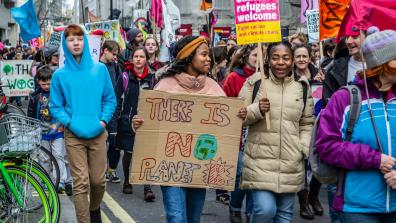Violence and displacement in Colombia
Communities in the Colombian provinces of Nariño and South Cauca are being displaced at an increasing rate. Paramilitary groups have been fighting to control the resource-rich area, which a subsidiary of British mining giant Anglo American has begun to mine. War on Want partner organisations NOMADESC and Palenque el Congal among others, including COPDICONC, are calling on the Colombian government and international community to protect poor and marginalised communities against displacement.
In the region west of the Andes, gold and uranium deposits are drawing increased interest from foreign companies. As the multinationals move in, residents are forced to flee. A Colombian subsidiary of Anglo American, Kedahda S.A., has already signed 110 contracts in the Nari?o region. In each region where Kedahda is working, human rights abuses continue and violence against residents is on the rise.
Displacement in Nariño
By May 2006, the conflict that has enveloped the mountain communities of Nariño became so intense that over 70% of residents have been forced to relocate. Communities such as El Charco, Policarpa and Guapi, have been vacated in response to the high militarisation of the area. This has led to indiscriminate crimes and the forced displacement of over 20,000 people who have had to leave their land, headed in many cases to the slums of overcrowded cities.
In March of this year intense combat resumed and a new mass displacement drive was announced on 10 March. Some residents left on foot whilst others had to swim the river. Many were forced to spend the night in the mountains to avoid the bombing raids. After two weeks, some residents planned to return home and collect their possessions but the paramilitaries had stolen almost everything of value.
In June 2007, the Colombian army backed by paramilitary group ransacked another region of Nari?o, announcing their arrival by firing shots in the air and beating members of the community. Residents fear an escalation to full-scale conflict and are preparing for displacement once again. The San Jose de Tapaje community has become a gathering point for the surrounding areas whose infrastructures are already showing signs of damage. In some areas food and drinking water have become scarce, whilst minimum security conditions do not even exist.
Intimidation of local populations
The paramilitary groups now active in the area were directly responsible for regular massacres of 15 to 20 people at a time over a span of several years - the death toll is estimated at 2800 since 2002. In recent months, examples of atrocities committed by these groups abound. Community leaders, businessmen and regular citizens have all been targets of assassination and torture.
Though these murders are common knowledge, none has been investigated by the authorities. Neither the municipal courts, nor the police authorities nor the mayoral office possess any official records of these deaths.
Paramilitaries have been known to kidnap and hold women and children for ransom to finance their operations, or demand bribes to allow people to remain on their land. These groups have also imposed taxes on goods ranging from trucks, fuel, cement to beer, making life ever more difficult for those living in the conflict zone.
Other reasons for displacement
The expansion of mining in Nariño is one reason for the region's importance to the groups vying for control, but it is not the only one. In May 2007, Colombia's president Alvaro Uribe Velez announced a huge government-sponsored palm cultivation programme, making the area more economically important.
Also at work is a new road-building initiative called the Regional Integration Infrastructure Initiative of South America (IIRSA), which is putting at risk of displacement many communities who stand in the path of the new roads. Contrary to international law, the government has unilaterally decided the routes without any consultation with the families who stand to lose their homes.
The displaced
Malnutrition and the lack of sustainable education, sanitation, work, and medical care violate the basic human rights of the displaced. The government institutions entrusted with safeguarding the rights of those who have been made homeless have failed to protect those most in need. It has become clear that there is no clear and functioning policy on how to deal with the forced displacement of people.
In response, NOMADESC and Palenque el Congal are demanding that the Colombian government respect the rights of those people living in the conflict zone, and protect them from further displacement. By training community members in how to protect their rights, publishing pamphlets on the ongoing crisis and lobbying national and local governments, these organisations are working to protect vulnerable communities.
To that end, our partners are asking that those in the international community share the news of the situation in Colombia, and keep up the pressure on the government.




